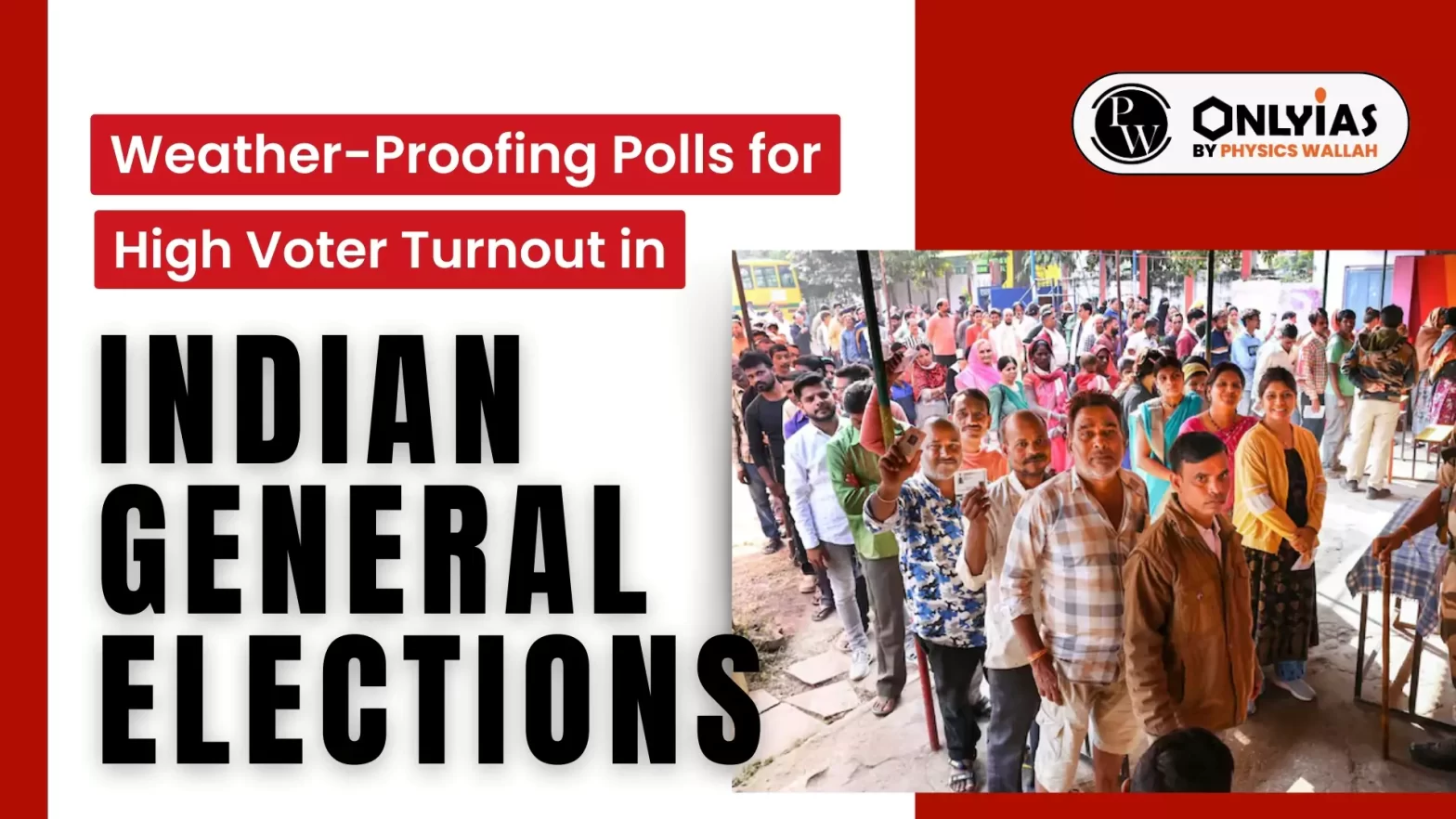Context
Election weather challenges prompt calls for weather-friendly schedules to maximize participation and democracy’s health in India.
Significance of Indian General Elections
- Indian General Elections: India, as the largest democracy in the world, is currently amidst its general elections, a moment of critical importance with a staggering 96.88 crore eligible voters.
- Global Impact of India’s Elections: Each vote cast signifies a commitment to democracy, and the outcome of these elections holds sway not only over India but also reverberates globally, influencing various world events.
- Deepening of Democratic values: Amidst the plethora of democracies holding elections, it is India’s electoral process that stands out as paramount in deepening democratic values worldwide.
Enroll now for UPSC Online Course
Participation and Efforts by Election Commission and Civil Society
- ECI’s Voter Outreach Efforts: Efforts to enhance participation in the elections are commendable, with the Election Commission of India (ECI) striving to reach out to voters, even in remote and inaccessible areas.
- Promoting Voter Awareness: Civil society organizations and the media have also played significant roles in raising awareness about the importance of voting.
- Early Voting Enthusiasm: The enthusiastic response from voters in the initial phases of voting reflects a positive trend.
- Voter Turnout Challenge: However, discussions surrounding voter turnout often highlight a significant challenge posed by the hot weather, which can potentially deter greater participation.
Mitigation Measures Implemented by Election Commission of India (ECI)
- ECI’s Swift Weather Mitigation Measures: Acknowledging the severity of the weather, the ECI swiftly implemented mitigation measures.
- Task Force Establishment: The Election Commission of India (ECI) collaborated with various agencies to monitor weather conditions and implement necessary measures.
- A task force comprising officials from ECI, IMD, NDMA, and MoHFW was set up to review the impact of heat waves and humidity on polling days.
- Voter Comfort Measures: Instructions were issued to ensure the provision of shelter, drinking water, and fans at polling stations, aiming to alleviate voter discomfort.
Impact on Voter Turnout
- Weather Challenge: With the need to conclude elections before the expiry of the term of the 17th Lok Sabha on June 16, the schedule spans from April to June, coinciding with India’s scorching summer temperatures.
- Voter Health Concerns: Despite the ECI considering weather conditions, the final deadline necessitates elections during this period, leading to concerns about voter discomfort and potential health risks.
- Voter Apathy: Harsh weather conditions, coupled with the need to travel long distances, can discourage voters, particularly in rural areas. Overcoming voter apathy becomes a significant challenge during the scorching summer months.
- Regular Occurrence of Extreme Weather: Extreme weather during elections is not uncommon in India, with temperatures often soaring above 40 degrees Celsius in many regions.
-
- The frequency and intensity of such weather events highlight the persistent challenge faced during electoral processes.
- Climate Change Impact: Climate change exacerbates weather extremes, posing even greater challenges for future elections held during the summer months.
- Adapting to these changing climatic conditions becomes imperative for ensuring the integrity and inclusivity of electoral processes.
Way Forward to Weather-Proofing Polls
- Reevaluating Election Timing: In light of these challenges, there is a pressing need to debate the timing of elections, considering the well-being of voters, campaigners, and election officials.
- Proposed Weather-Friendly Election Schedule: A weather-friendly timetable for general elections is proposed, emphasizing the importance of maximizing participation to strengthen democracy.
- Addressing Climate Concerns in Election Planning: While not part of the High-Level Committee on Simultaneous Elections’ recommendations, this proposal underscores the seriousness of climate concerns and the necessity for a collective response from all stakeholders to ensure conducive weather conditions for elections.
Enroll now for UPSC Online Classes
Conclusion
By advocating for a weather-friendly election timetable, stakeholders can pave the way for maximum participation and uphold democratic values in India and globally. This collective endeavor is essential to navigate the challenges posed by climate change and safeguard the integrity of electoral processes.
Also Read: Analysing India’s Climate Policy
![]() 6 May 2024
6 May 2024

